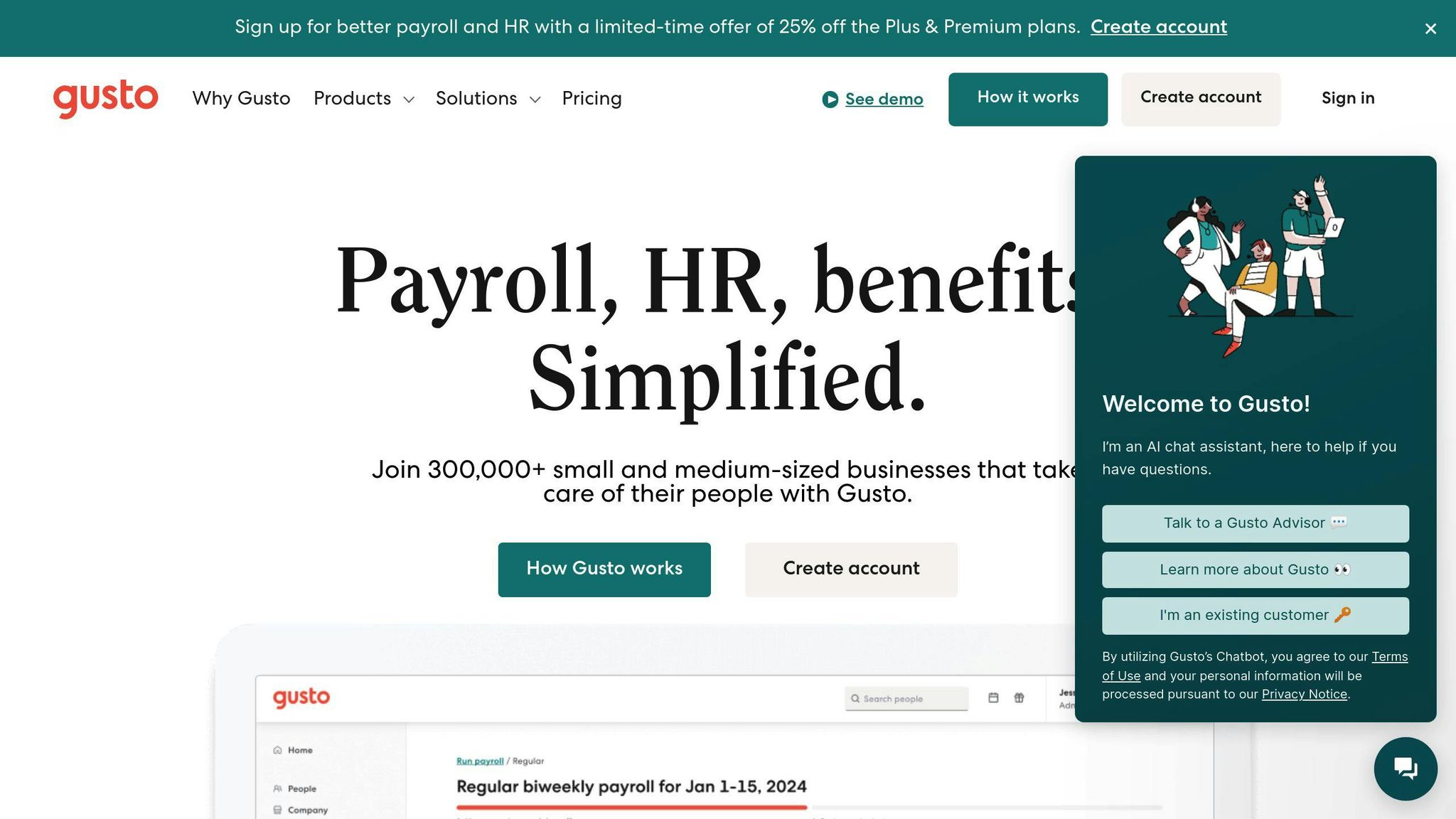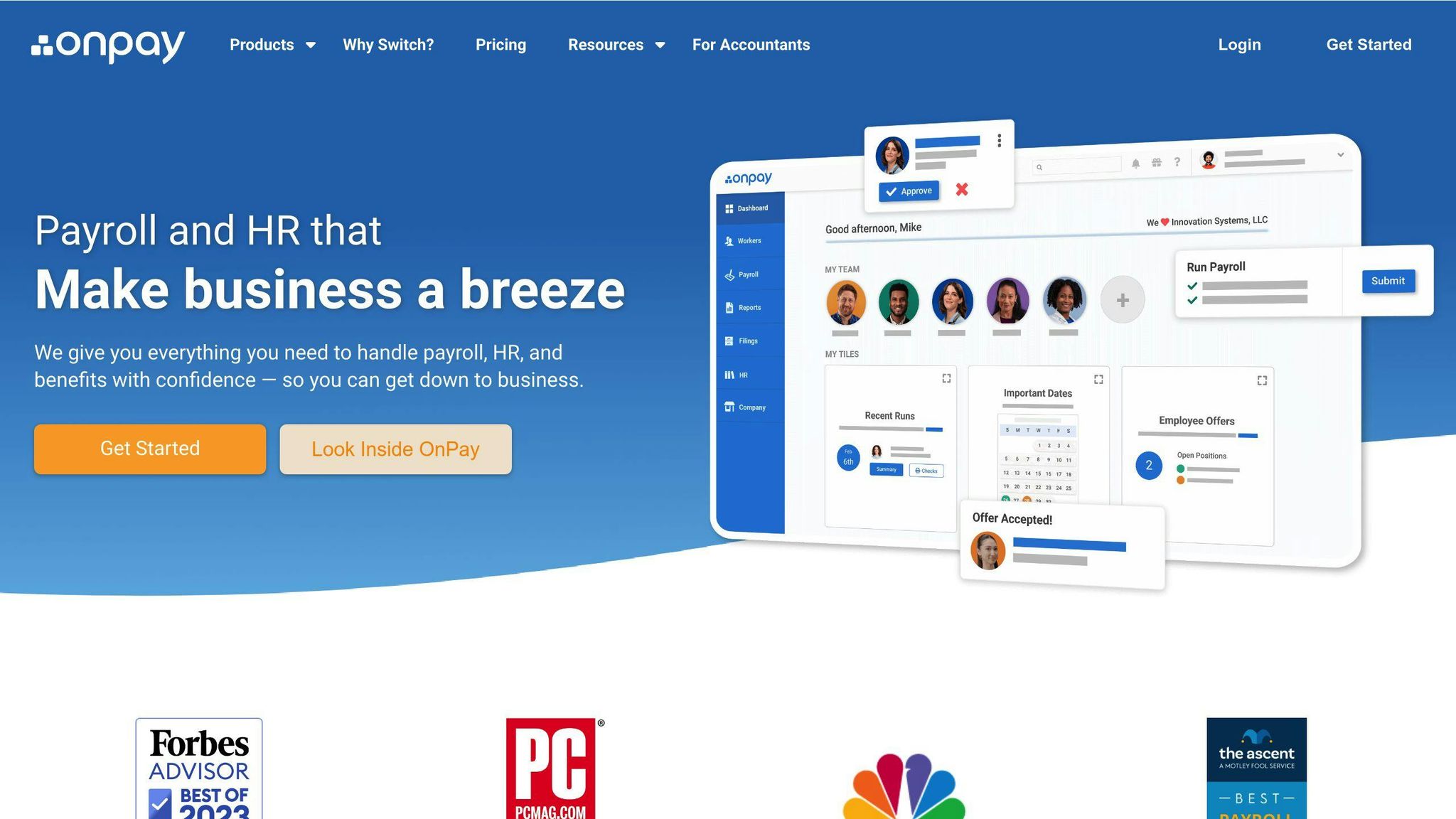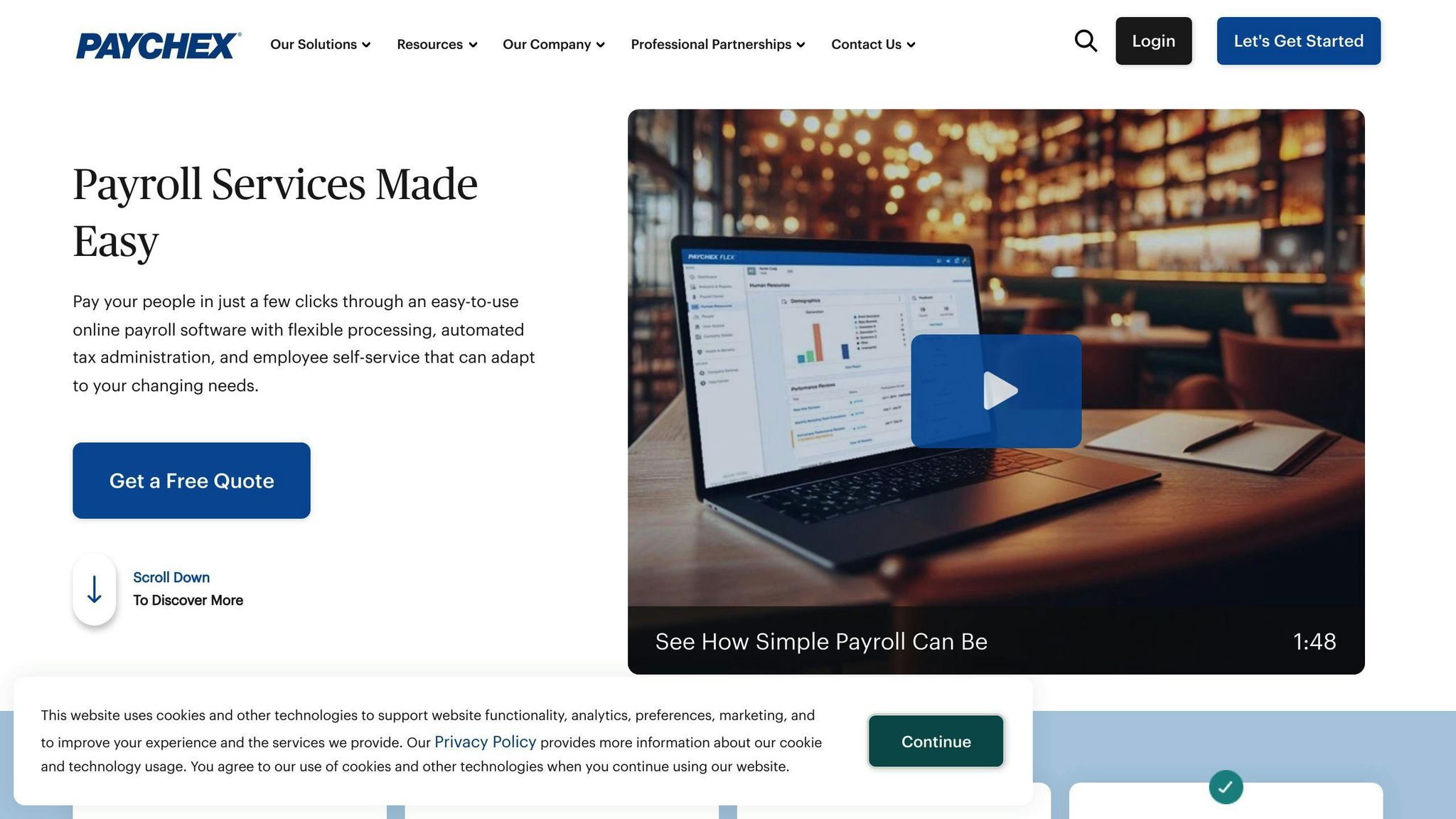Payroll software automates tasks like payroll management, time tracking, and tax filing to reduce manual errors and ensure compliance. This guide covers:
Pricing Models
- Per Employee: $2-$15/employee/month (e.g., Patriot $4/employee)
- Subscription: Fixed monthly/annual fee with tiered plans
- Pay-As-You-Go: Pay only for services used
Key Cost Factors
| Factor | Description |
|---|---|
| Company Size | Larger companies require more advanced features |
| Feature Set | More features = higher cost |
| Integrations | Integrating with existing systems adds costs |
| Support | Premium support plans cost extra |
Popular Vendors
| Vendor | Pricing Model | Cost Range | Key Features |
|---|---|---|---|
| Gusto | Tiered subscription | $40-$80/mo + $6-$12/emp/mo | Payroll, tax filing, HR tools, employee banking |
| OnPay | Per employee | $36/mo + $4/emp/mo | Unlimited payroll runs, tax payment, time tracking |
| Paychex Flex | Tiered subscription | $39-$79/mo + $5-$2/emp/mo | Payroll, tax filing, compliance, HR tools |
Other Costs
- Setup and data migration fees
- Integration and customization costs
- Ongoing maintenance and support subscriptions
Choosing the Right Software
- Assess your payroll needs
- Compare pricing and features
- Review contracts and fees
- Consider user reviews
Related video from YouTube
Payroll Software Pricing Models
Payroll software providers use different pricing structures to cater to various business needs and sizes. Understanding these models is crucial to choosing the right payroll software for your organization.
Per Employee Pricing
| Provider | Monthly Fee | Per Employee Fee | Example Cost (100 employees) |
|---|---|---|---|
| Patriot Software | $17 | $4 | $417 |
| Gusto | $40 | $6 | $640 |
This model is suitable for businesses with a fixed workforce. The typical rate ranges from $2 to $15 per employee, per month.
Subscription Pricing
Subscription-based pricing involves a fixed monthly or annual fee, often with tiered plans offering varying levels of features and services. This model is ideal for businesses with fluctuating workforce numbers or those requiring advanced features.
Pay-As-You-Go Pricing
Pay-as-you-go pricing is a flexible model that charges only for the services used. This model is suitable for businesses with irregular payroll cycles or those requiring ad-hoc payroll services.
Hybrid Pricing Models
Hybrid pricing models combine elements of per-employee, subscription, and pay-as-you-go pricing. These models offer customization and flexibility, making them suitable for businesses with unique payroll requirements.
When evaluating payroll software pricing models, consider your business needs, workforce size, and budget to choose the most suitable model.
Factors Affecting Payroll Software Costs
Company Size and Costs
The size of your company plays a significant role in determining the cost of payroll software. Larger organizations require more advanced features and integrations, leading to higher costs. Smaller businesses with simpler payroll needs can opt for more affordable, basic solutions.
Feature Set Costs
The cost of payroll software increases with the range of features included. Basic plans cover core payroll processing functions, while more comprehensive plans add advanced capabilities like time tracking, PTO management, direct deposit, tax filing, and compliance reporting.
Feature Comparison
| Feature | Basic Plan | Comprehensive Plan |
|---|---|---|
| Payroll Processing | ||
| Time Tracking | ||
| PTO Management | ||
| Direct Deposit | ||
| Tax Filing | ||
| Compliance Reporting |
Integration Costs
Integrating payroll software with existing HR, accounting, or time tracking systems can add to the overall cost. The complexity of the integration and the number of systems involved affect the implementation and ongoing fees.
Support and Training Costs
The level of customer support and training required also impacts payroll software costs. Basic support is often included, but premium options like dedicated account managers or on-site training come at an additional cost. Businesses with complex needs or limited payroll expertise may benefit from higher-tier support plans despite the increased expense.
Popular Payroll Software Vendors in 2024
In this section, we'll explore three popular SaaS payroll software vendors, including their pricing models, cost ranges, and feature sets.
Gusto Payroll

Gusto is a well-known, full-service payroll software platform for small businesses and startups. It offers automated or manual payroll processing for employees and independent contractors across the U.S. Gusto provides additional services like comprehensive HR tools and an employee-focused bank and savings account with a debit card.
Gusto's pricing plans cater to businesses of various sizes, with three tiers:
| Plan | Monthly Fee | Per Employee Fee | Features |
|---|---|---|---|
| Simple | $40 | $6 | Payroll processing, tax filing, compliance reporting |
| Plus | $80 | $12 | Multi-state payroll, next-day direct deposit, advanced HR tools |
| Premium | Custom | Custom | All Plus features, HR resource center, live HR experts |
OnPay Payroll

OnPay is a complete payroll system ideal for SMBs that require scalability. It streamlines payroll processes and automates tax payment and filing. OnPay's pricing plan is transparent:
| Monthly Fee | Per Employee Fee | Features |
|---|---|---|
| $36 | $4 | Unlimited payroll runs, automatic tax payment and filing, direct deposit or check payment options, time tracking, PTO management, benefits administration |
Paychex Flex Payroll

Paychex Flex is a comprehensive payroll solution designed for businesses of all sizes. It offers a range of features, including payroll processing, tax filing, and compliance reporting, as well as advanced HR tools.
Paychex Flex's pricing model is based on the number of employees, with costs ranging from:
| Plan | Monthly Fee | Per Employee Fee | Features |
|---|---|---|---|
| Basic | $39 | $5 | Payroll processing, tax filing, compliance reporting |
| Enhanced | $79.20 | $2 | Automatic tax form filling, electronic tax filing and payment, error-free guarantee |
| Full Service | $79.20 | $2 | Everything in Enhanced plan, plus setup and running of payrolls, data transfers, error-free guarantee |
| Vendor | Pricing Model | Cost Range | Feature Set |
|---|---|---|---|
| Gusto | Tiered | $40-$80/month + $6-$12/employee/month | Payroll processing, tax filing, compliance reporting, HR tools, employee-focused bank and savings account |
| OnPay | Per-employee | $36/month + $4/employee/month | Unlimited payroll runs, automatic tax payment and filing, direct deposit or check payment options, time tracking, PTO management, benefits administration |
| Paychex Flex | Tiered | $39-$79.20/month + $5-$2/employee/month | Payroll processing, tax filing, compliance reporting, time tracking, PTO management, benefits administration, automatic tax form filling and electronic tax filing and payment, error-free guarantee |
sbb-itb-e3aed85
Other Payroll Software Costs
When evaluating payroll software, it's essential to consider often overlooked expenses that can add up quickly. These additional costs can significantly impact your overall budget, making it crucial to factor them into your decision-making process.
Setup Costs
Implementing a new payroll system can come with one-time setup costs, which may include fees for:
- Data migration
- Configuration
- Training
These expenses vary depending on the complexity of your payroll needs and the vendor's pricing model.
Integration and Customization Costs
Customizing the software to fit your specific organizational needs can also incur additional costs. This may involve:
- Integrating the payroll system with existing HR, accounting, or time-tracking systems
- Requiring professional services and technical expertise
Be sure to factor in these costs when evaluating different payroll software options.
Maintenance and Update Costs
Long-term costs related to software updates, maintenance, and support subscriptions should also be considered. These expenses can include:
| Cost Type | Description |
|---|---|
| Software updates | Regular updates to ensure the software remains secure and compliant |
| Maintenance | Ongoing support to resolve technical issues and ensure smooth operation |
| Support subscriptions | Fees for access to technical support, training, and resources |
By accounting for these often overlooked costs, you can ensure a more accurate understanding of the total cost of ownership for your payroll software and make a more informed decision when selecting a vendor.
Choosing the Right Payroll Software
Selecting the right payroll software is crucial for efficient and cost-effective payroll management. Here are some key considerations to help you choose the right solution for your business:
Assess Your Payroll Needs
Before evaluating payroll software options, take the time to understand your organization's unique payroll requirements. Consider factors such as:
- Number of employees
- Pay schedules
- Tax jurisdictions
- Industry regulations
This will help you identify the essential features and capabilities you need from a payroll solution.
Compare Pricing and Features
Research and compare the pricing models and feature sets of different payroll software vendors. Look for solutions that offer the functionalities you require at a cost that fits within your budget. Consider factors such as:
| Feature | Description |
|---|---|
| Tax compliance | Automatic tax calculation and filing |
| Direct deposit | Electronic payment of employee salaries |
| Employee self-service | Online portal for employees to access payroll information |
| Reporting tools | Customizable reports for payroll analysis and compliance |
Review Contracts and Fees
Carefully review the contract terms and conditions of any payroll software you're considering. Pay close attention to:
- Pricing structure
- Hidden fees or additional charges
- Contract length and cancellation policies
Consider Reviews and Recommendations
Seek out reviews and recommendations from other businesses in your industry or with similar payroll needs. Read user reviews and ratings to gain insights into the software's usability, customer support, and overall satisfaction.
By following these steps, you can make an informed decision and choose a payroll software solution that provides the best value for your business while avoiding unnecessary costs.
Summary
SaaS Payroll Software Costs 2024: Pricing Guide Summary
In this summary, we will review the key points of SaaS payroll software costs in 2024.
Pricing Models
Payroll software providers use different pricing structures to cater to various business needs and sizes. The three main pricing models are:
| Pricing Model | Description |
|---|---|
| Per Employee Pricing | Suitable for businesses with a fixed workforce |
| Subscription Pricing | Ideal for businesses with fluctuating workforce numbers or those requiring advanced features |
| Pay-As-You-Go Pricing | Suitable for businesses with irregular payroll cycles or those requiring ad-hoc payroll services |
Factors Affecting Costs
Several factors influence the cost of payroll software, including:
- Company size and costs
- Feature set costs
- Integration costs
- Support and training costs
Popular Payroll Software Vendors
We reviewed three popular SaaS payroll software vendors, including their pricing models, cost ranges, and feature sets.
Choosing the Right Payroll Software
When selecting a payroll software solution, consider the following key factors:
- Assess your payroll needs
- Compare pricing and features
- Review contracts and fees
- Consider reviews and recommendations
By following these steps, you can make an informed decision and choose a payroll software solution that provides the best value for your business.
FAQs
What is the most popular payroll software?
What is the most popular payroll software?
Several payroll software options are popular among businesses. Here are a few examples:
| Software | Description |
|---|---|
| Gusto | A cloud-based payroll solution that simplifies payroll processing, tax filing, and compliance management. |
| OnPay | A user-friendly payroll software that offers automated tax calculations, direct deposit, and HR tools. |
| Intuit QuickBooks | A well-established accounting software that includes a robust payroll module with various plans to suit different business needs. |
These payroll software options are popular due to their ease of use, scalability, and comprehensive feature sets.
